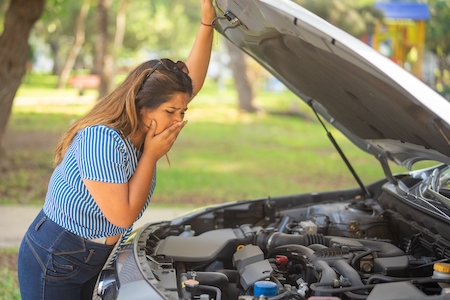You’re ready to start your day. You grab a cup of coffee, throw your bag over your shoulder, and whistle as you jump behind the wheel.
You turn the keys and … What’s that smell?
Im might surprise you to learn that many of the most common car smells are put there on purpose. In some cases, the parts themselves put off certain odors when they’re under duress. Others are designed to alert you to problems long before they can put you in danger.
The next time you ask, “What’s that smell” use this handy car smells guide to learn more about what it means.
General Burning Smell
If you catch a whiff of something burning, addressing the issue promptly is essential. A burning smell can indicate several problems, such as overheating brakes, an electrical issue, or a worn-out clutch. It’s best to have a professional mechanic inspect your car to identify the source of the smell and address the underlying problem.
Rubber Burning Smell
A rubber burning smell can be quite distinct and may indicate an issue with your car’s belts or hoses. Over time, these components can become worn out or damaged, causing them to rub against each other and produce a burning odor. It’s crucial to have these parts checked and replaced if necessary to prevent further damage and potential breakdowns.
Air Conditioning Smell
If you notice a foul smell when you turn on your car’s air conditioning, it’s likely caused by mold or mildew growth in the system. The moist environment created by the air conditioning system can become a breeding ground for bacteria and fungi. To eliminate the smell, you can try using a specialized air conditioning cleaner or have a professional service your car’s AC system.
Sweet Car Smell
A sweet, syrup-like smell in your car can signal a coolant leak. Coolant, also known as antifreeze, has a sweet odor and taste. If you detect this smell, it’s essential to have your cooling system inspected immediately. A coolant leak can cause your engine to overheat, leading to severe damage if left unaddressed.
Musty Car Smell
A musty smell in your car is often a sign of water infiltration. Water can seep into your vehicle through leaks in the doors, windows, or sunroof, or it could be caused by a clogged drainage system. To get rid of the musty smell, you’ll need to locate and fix the source of the water intrusion. It’s also crucial to dry out any damp areas to prevent mold and mildew growth.
Clutch Burning Smell
If you drive a manual transmission car and notice a burning smell while operating the clutch, it may be due to excessive clutch slippage. Clutch slippage occurs when the clutch disc fails to engage properly with the flywheel, resulting in friction and a burning odor. A professional should address this issue promptly to avoid further damage to the clutch system.
Burning Plastic Smell
A burning plastic smell can be a cause for concern as it often indicates an electrical issue. It could be due to a malfunctioning component, a short circuit, or a wiring problem. Electrical issues can be hazardous, so it’s essential to have your car inspected by a professional as soon as possible to prevent any potential fire hazards.
Fuel Smell
If you smell fuel inside or outside your car, it could indicate a fuel leak. A leaky fuel injector, a damaged fuel line, or a faulty fuel tank can all contribute to a fuel smell. Fuel leaks are dangerous and can also affect your car’s performance and fuel efficiency. It’s crucial to have a mechanic diagnose and repair the issue promptly.
Exhaust Smell
Exhaust smells are usually associated with an issue in the exhaust system. A strong, pungent smell of exhaust fumes inside your car can indicate a leak in the exhaust manifold, pipe, or muffler. This affects your vehicle’s performance and poses health risks due to the inhalation of toxic gasses. Don’t delay in having your exhaust system inspected and repaired.
Rotten Egg Smell
If you notice a rotten egg smell, it’s a clear sign of a problem with your car’s catalytic converter. The catalytic converter is responsible for converting harmful gasses into less harmful emissions. A sulfur-like smell usually indicates that the converter is not functioning correctly. It’s crucial to have your vehicle inspected by a professional to determine the cause and take appropriate action.
Damp Car Smell
A damp or musty smell inside your car can result from water infiltration. However, it can also be caused by wet floor mats, carpeting, or upholstery. Make sure to check for any moisture sources and address them promptly to prevent mold and mildew growth.
Burning Hair Smell
Oddly enough, detecting a burning hair smell could indicate a problem with your car’s clutch or braking system. If you’re out on the open road and your brakes start overheating, they create a distinctive odor you can’t miss. This is possible as you travel across Colorado, moving up and down hills in your journey into the mountains. If this occurs while driving downhill, switch to a low gear and pull over immediately. It’s essential to have a professional mechanic inspect and diagnose the issue to avoid any further damage.
What’s that smell? Get it fixed early.
Remember, promptly identifying and addressing car smells can help prevent more significant problems. When in doubt, it’s always best to consult a professional mechanic who can provide you with an accurate diagnosis and appropriate repairs.
The next time you encounter an unpleasant smell in your car, don’t ignore it – take action and keep your vehicle running smoothly and smelling fresh!


 This is the one smell you might mistake for an old, moldy snack left under the seats. As your car operates, you notice a rotten egg smell coming through the vents.
This is the one smell you might mistake for an old, moldy snack left under the seats. As your car operates, you notice a rotten egg smell coming through the vents.